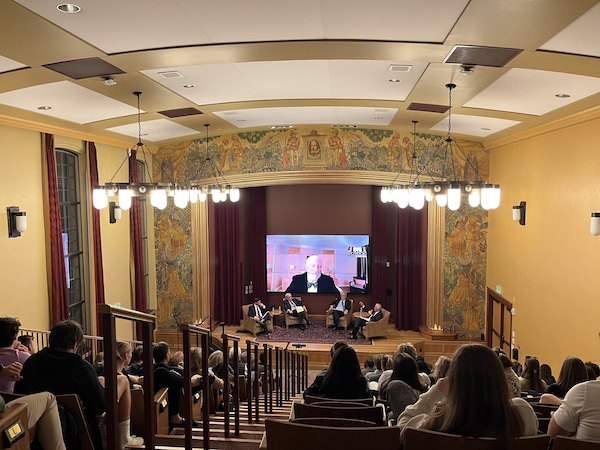More than 150 attend debut Ethics Matter event hosted by Business Ethics and Legal Studies department
Earlier this year, Ernst & Young (EY) announced what would be a major shakeup in the business world, proposing to split its audit and consulting businesses into two separate entities. To explore the implications of the move, Daniels’ Business Ethics and Legal Studies (BELS) department recently gathered an esteemed panel of experts for a discussion on the legal, ethical and business impacts it will have.
More than 150 Daniels students, faculty, staff and members of the Denver business community filled the Reiman Theater Nov. 2 for the debut of the Ethics Matters series. BELS created Ethics Matters to stimulate dialogue and engagement between University and community stakeholders on important issues at the intersection of business, ethics, policy and law.
The panel was augmented by the attendance of Frank Mahoney, a 36-year EY employee that currently serves as the company’s U.S.-West regional managing partner, Americas vice chair and member of the Americas Operating Executive Board and U.S. Executive Board. While Mahoney couldn’t speak directly on the inner workings of the proposed move, he offered important perspective on EY’s motivation and what the future may look like if the deal goes through.
Mahoney was joined on the panel by Doug Scrivner (JD 1977), chair emeritus of the University’s Board of Trustees, J. Robert Brown, a faculty member at the Sturm College of Law, and Jim Peterson, former litigator at Arthur Andersen. Bruce Klaw, BELS department chair and faculty member, moderated the discussion.

In setting the stage for the motivation to split EY’s audit and consulting arms, the group discussed the major accounting fraud scandals that marked the late 1990s and early 2000s. Enron’s collapse in 2001 is most familiar to the public, but Waste Management, WorldCom and Tyco all had scandals of their own during that time.
Mahoney said this period was the lowest time in his career, largely because the reputation for certified public accountants was soiled by these scandals. To rectify, and ideally eliminate, these audit and consulting disasters, Congress passed the Sarbanes-Oxley Act of 2002, creating sweeping reform for corporate and public accounting practices.
Brown said this action from Congress, and the subsequent creation of the Public Company Accounting Oversight Board, brought additional trust to this field in a time of turmoil. Investors that were relying on the system to be run honestly could now lean more heavily on this newly created board for transparency.
“For investors to trust the system you need a regulator who can go in and examine what’s going on, test what’s going on and inspect what’s going on,” Brown said.
Now, as EY debates a potentially industry-altering move nearly two decades after these reforms, the question of what will happen to the remaining Big Four accounting firms (Deloitte, KPMG and PricewaterhouseCoopers) looms. EY’s partner vote on the split likely won’t happen until 2023, but Mahoney shared some details on the company’s motivation in exploring the move.
By splitting the two business arms into separate entities, Mahoney said the consulting company would find additional opportunities that were previously barred due to conflicts. In the audit and consulting world, companies walk a regulatory tightrope on mixing their advisory services with their financial work.
“The ability of the audit firm to be more focused on audits allows us to have the opportunity to serve as the auditor for many more companies,” Mahoney said.
When asked if EY’s separated business arms would have any formal or informal referral deals in the future, Mahoney answered unequivocally no.
“We’re doing this for a reason and to start putting a bunch of trade agreements would be counter to [that],” Mahoney said.
